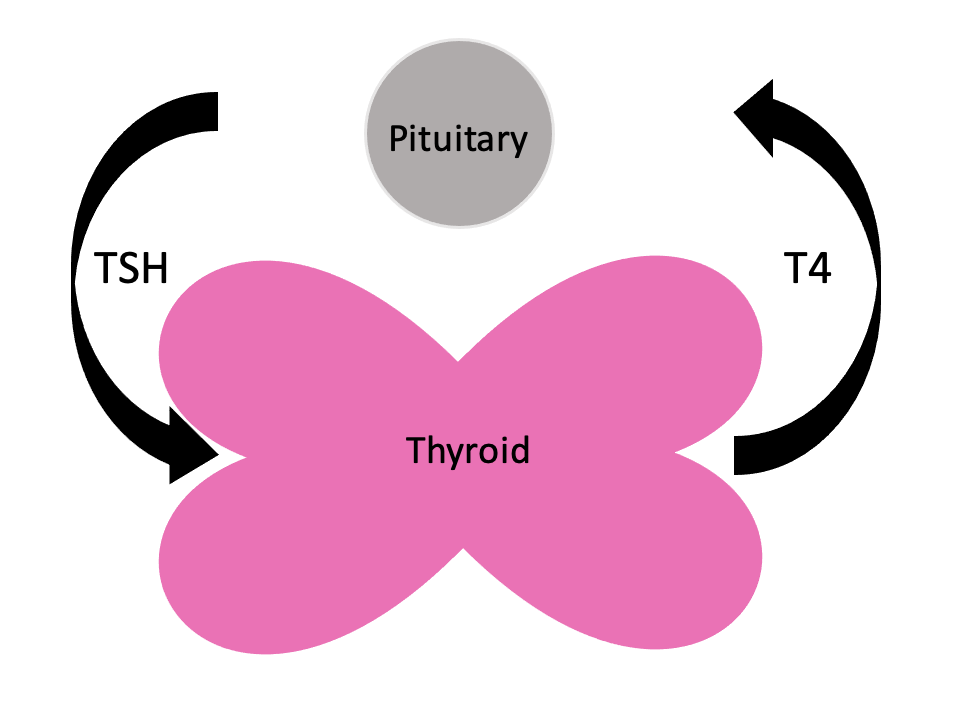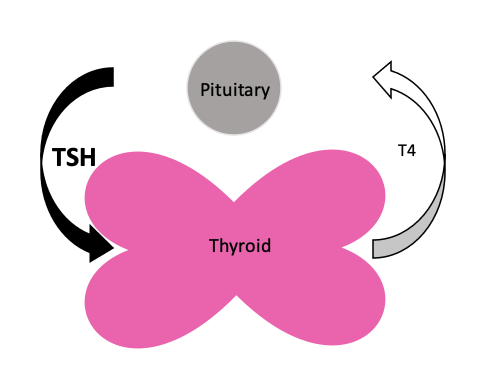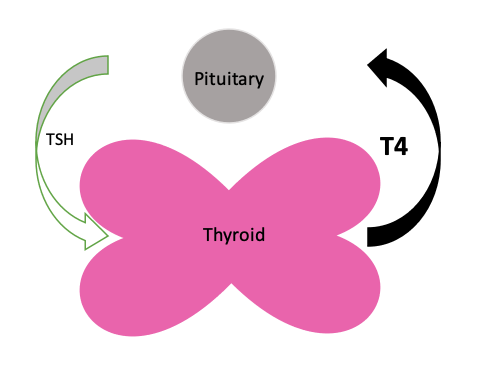Although small, your thyroid has a big impact on your overall health. When it’s working as it should, most people don’t think about the role of their thyroid. As an endocrinologist, my specialty is the diagnosis and treatment of hormone-related conditions.
So, let’s talk more about this little gland and how it helps your body.
What Is a Thyroid?
The thyroid is a butterfly-shaped gland that sits in the front of the neck. Its job is to make thyroid hormone (T4) which circulates through the blood to the rest of the body. This hormone helps your body use energy.
How Does the Thyroid Work?
The thyroid works by creating T4 (which has 4 iodine molecules) that the body converts to T3 to use as energy when needed. The pituitary, which is a small gland in the brain, regulates how much thyroid hormone is created by producing thyroid stimulating hormone (TSH). There is a feedback loop created to keep everything in balance.

If the TSH increases, then the thyroid responds by making more T4. If the T4 increases, then the pituitary responds by reducing the amount of TSH produced. It’s like a faucet; the TSH turns on the T4 and the T4 turns off the TSH.
What Is Hypothyroidism?
Hypothyroidism is when the body does not have enough thyroid hormone (T4). This causes an increase in the TSH. It might also be referred to as an underactive thyroid.

Diagnosing hypothyroidism: Diagnosis is made when laboratory blood tests show an elevated TSH and a low T4.
Symptoms of hypothyroidism can vary but include: Feeling colder, getting tired more easily, drier skin, becoming depressed and developing constipation.
Some causes of hypothyroidism are: Hashimoto’s disease, surgical removal of the thyroid, radioactive iodine, thyroiditis, some types of medication and damage to the pituitary gland.
- Hashimotos is an autoimmune disease where antibodies (TPO or thyroid peroxidase antibodies) cause damage to the thyroid, making it unable to produce thyroid hormone. This can happen quickly or over several years. It is more common in women and tends to run in families.
Treatment of hypothyroidism: Prescription levothyroxine (T4). It is important to take this medicine first thing in the morning without any other medications, supplements or food.
What Is Hyperthyroidism?
Hyperthyroidism is when the body produces too much thyroid hormone (T4) which results in a decreased TSH. It might be referred to as an overactive thyroid.

Diagnosing hyperthyroidism: Diagnosis is often made when laboratory blood tests show a low TSH with an elevated T4 and/or T3. Some patients may need an ultrasound and thyroid uptake scan to diagnose toxic thyroid nodules or thyroiditis.
Symptoms of hyperthyroidism can include: Nervousness, anxiety, increased sweating, palpations (which can cause an irregular heart beat), hand tremor, difficulty sleeping, muscle weakness (especially upper arms and thighs) and increased frequency of bowel movements.
Some causes of hyperthyroidism include: Grave’s Disease (autoimmune), toxic nodules, thyroiditis or too much thyroid hormone replacement.
- Grave’s Disease is an autoimmune disease and the most common cause of hyperthyroidism. It is caused by an antibody called TSI (thyroid stimulating immunoglobulin) that triggers the thyroid to produce too much thyroid hormone. It can also be associated with an eye disease that causes bulging of the eyes.
- A thyroid nodule is an abnormal growth of tissue within the thyroid gland. A toxic nodule causes the thyroid gland to produce excessive amounts of thyroid hormone without the influence of TSH.
- Thyroiditis is an inflammation of the thyroid gland that results in damage to the thyroid cells. It can be caused by several things including infection, autoimmune disease or some medications. Some women may also experience thyroiditis within a year after giving birth. Symptoms are usually those of hyperthyroidism initially and then hypothyroidism as the thyroiditis runs its course. In most people, thyroiditis resolves itself.
Treatment depends on the cause of hyperthyroidism: If the cause is Grave’s Disease, it can be treated with medication, radioactive iodine or surgical removal of the thyroid gland. A toxic nodule is treated with surgical removal of the nodule. Thyroiditis usually improves on its own with treatment of the underlying cause, and patients often receive treatment only for symptoms they are experiencing.
What Should I Do if I Think I May Have a Thyroid Problem?
Consult with your doctor about your symptoms and/or concerns.

Madeline Jones-Ryan, DO
Madeline Jones-Ryan, DO is an endocrinologist with Complete Endocrinology, part of Bryan Physician Network.









